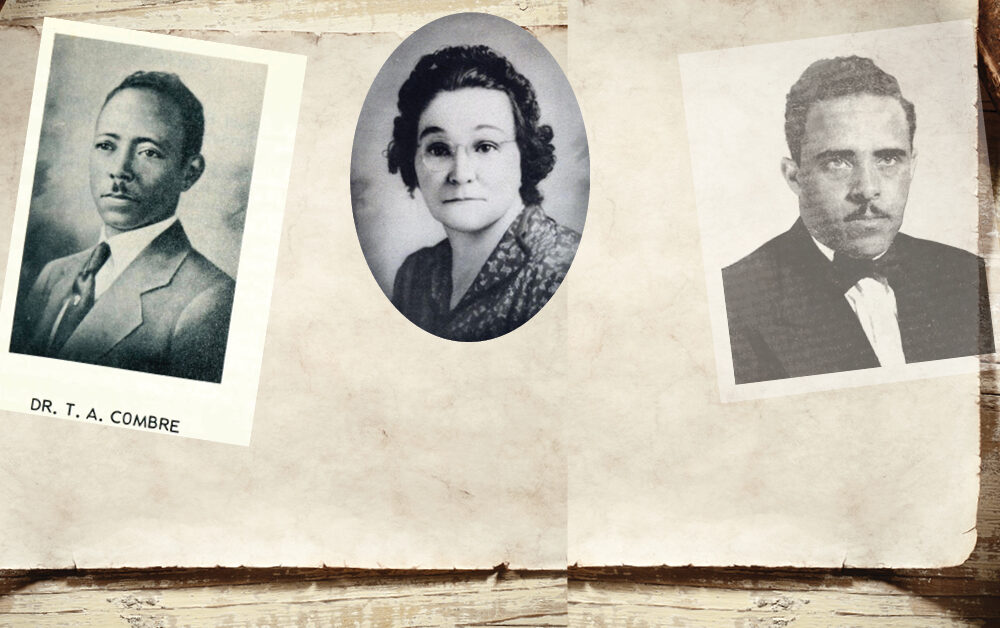
Makeup Tips that Won’t Age You
February 2022
Spotlight on Black-Owned Businesses in SWLA
February 2022compiled by Angie Kay Dilmore
Dr. Theophile Albert Combre Sr. was one of Louisiana’s outstanding physicians and surgeons. Born in 1892, he graduated from New Orleans University and Meharry Medical College in Nashville, Tennessee. Dr. Combre practiced medicine in Oakdale until 1926, when he moved to Lake Charles. He devoted his time and energy to the welfare of his fellow man, often providing services free of charge and filling prescriptions for the needy. He attended and served at Warren Chapel M. E. Church and was president of the Southwestern Medical Association. Dr. Combre died of tuberculosis at age 45 on March 12, 1937, in Kerrville, Texas. His remains were brought back to Lake Charles and interred at the family cemetery.
Doretha A. Combre (Dr. Combre’s wife) fought for better Black educational opportunities. She was instrumental in opening McNeese State University (MSU) to Black students in 1954. When a few Black students struggled with enrollment, Combre made a call to her friend, Thurgood Marshall, an up-and-coming lawyer who went on to become the first Black man on the U.S. Supreme Court. Marshall and three other lawyers filed suit against MSU in September 1954. The plaintiffs — the students who were turned away — won the lawsuit, and the first Black students enrolled in McNeese later that year.
Combre was an energetic visionary who was unafraid of opposition and was committed to the cause of better education. She and Dr. Combre met in New Orleans while she was in college; he in medical school. They married in June, 1919 and had six children. After the death of her husband, Doretha sold insurance by day and taught school at night. She was a member of the NAACP, eventually becoming state president and serving on the national board.
Besides her involvement with education, Doretha was also a faithful leader in her church, Warren United Methodist Church. She also spent time in the family’s funeral home and flower shop business. Doretha and her son T.A. Jr. opened Combre Funeral Home.
In 1952, Combre became the first Black woman in Lake Charles to run for the School Board as a member-at- large. She lost, but after her death 21 years later, her son Warren was elected to the School Board and served for 14 years. D.A. Combre Elementary School on Fitzenreiter Road was named for Doretha Combre.
Nellie Rose Lutcher (1912-2007) was an American R&B and jazz singer and pianist who gained prominence in the late 1940s and early 1950s. She was most recognizable for her diction and exaggerated pronunciation and was credited as an influence by Nina Simone, among others.
Lutcher was born in Lake Charles, the eldest daughter of the 15 children of Isaac and Suzie Lutcher. Nellie grew up on Enterprise Blvd. in a musically inclined family. At an early age she received piano lessons, and her father formed a family band with Lutcher on piano. She also played piano at her church. At age 12, she performed with Ma Rainey after Rainey’s regular pianist became ill. Lutcher went on to perform with many legendary musicians and enjoy her own solo career. In 2007 Lake Charles renamed a portion of Enterprise Boulevard the Nellie Lutcher Parkway, and in 2015, the Nellie Lutcher Cultural District was established. Lutcher died at age 94 in Los Angeles.
Judge Norma Holloway Johnson became the court’s first black female chief judge, served more than two decades on the federal bench, and oversaw dozens of high-profile cases. Known as a no-nonsense jurist, she did not hesitate to lecture defendants about their conduct or lawyers who seemed ill-prepared for court. As chief judge from 1997 to 2001, Judge Johnson oversaw legal issues emanating from grand jury investigations. One of her most demanding assignments came when independent counsel Kenneth W. Starr began investigating Clinton’s relationship with White House intern Monica Lewinsky. In 1998, as Starr was attempting to use a grand jury to gather evidence against the president, Judge Johnson ruled that Clinton could not assert a privilege that would have blocked the independent counsel from questioning White House aides. That decision and others permitted Starr to move ahead with his obstruction-of-justice inquiry of the president.
Born in 1932 in Lake Charles, Judge Normalie Holloway and her younger brother grew up in a wood-frame house with no indoor plumbing. Her mother, Beatrice, pushed her children to excel. At age 12, Judge Johnson worked as a soda shop clerk for $9 a week to help her family make ends meet. Concerned for her daughter’s education, Beatrice sent Normalie to live with an aunt in Washington, D.C. A 1950 graduate of Dunbar High School, Judge Johnson earned a bachelor’s degree from the District of Columbia Teachers College in 1955. Soon after, she considered becoming a lawyer.
While teaching junior high, she attended Georgetown University’s law school, graduating in 1962. Two years later, she married Julius A. Johnson, who went on to become a federal administrative law judge. Judge Johnson was a civil trial lawyer for the Justice Department and then joined the District’s corporation counsel’s office, where she became chief of the juvenile division. In 1970, she was one of two women appointed as judges to the newly formed D.C. Superior Court and a decade later was tapped by Carter to join the federal bench. She and Julius never had children. After he died, Judge Johnson moved back to Lake Charles to live with her brother. She died in 2011.
Rev. Victor Elijah Washington
was one of the Lake Area’s first civil rights activists and the first Black person to serve on the Calcasieu Parish School Board. He attended McDonough 24 Elementary School and McDonough 35 High School in New Orleans and graduated from Leland High School in Baker but called Lake Charles home for nearly 50 years.
This World Was II Army veteran earned his bachelor’s degree from Leland College in 1945. He earned a Master of Divinity degree from Virginia Union University School of Religion in 1948 and was awarded an honorary Doctor of Divinity degree from Leland College in 1956.
After serving as a supervisor of missions in Baton Rouge, Rev. Washington was elected pastor of New Sunlight Baptist Church in 1951 and was active in the desegregation of Lake Charles schools.
He led a march on the former all-white Melrose School, which became Fisherville School, after Black children in the Fisherville community were being bused to St. John School. Washington’s efforts led to the building of Carver Elementary School.
Washington, along with other Black ministers, their wives and Black community leaders, sought the peaceful desegregation of lunch counters and buses in Lake Charles in the 1960s. He organized the first licensed day care in SWLA and served as vice president of Gulf Assistance, the first head start program in Lake Charles.
Rev. Washington continued to be spiritually and politically active throughout his life, receiving many awards for his distinguished service. Rev. Washington died Oct. 4, 1999
Dr. Theophile Albert Combre Sr. was one of Louisiana’s outstanding physicians and surgeons. Born in 1892, he graduated from New Orleans University and Meharry Medical College in Nashville, Tennessee. Dr. Combre practiced medicine in Oakdale until 1926, when he moved to Lake Charles. He devoted his time and energy to the welfare of his fellow man, often providing services free of charge and filling prescriptions for the needy. He attended and served at Warren Chapel M. E. Church and was president of the Southwestern Medical Association. Dr. Combre died of tuberculosis at age 45 on March 12, 1937, in Kerrville, Texas. His remains were brought back to Lake Charles and interred at the family cemetery.
Doretha A. Combre (Dr. Combre’s wife) fought for better Black educational opportunities. She was instrumental in opening McNeese State University (MSU) to Black students in 1954. When a few Black students struggled with enrollment, Combre made a call to her friend, Thurgood Marshall, an up-and-coming lawyer who went on to become the first Black man on the U.S. Supreme Court. Marshall and three other lawyers filed suit against MSU in September 1954. The plaintiffs — the students who were turned away — won the lawsuit, and the first Black students enrolled in McNeese later that year.
Combre was an energetic visionary who was unafraid of opposition and was committed to the cause of better education. She and Dr. Combre met in New Orleans while she was in college; he in medical school. They married in June, 1919 and had six children. After the death of her husband, Doretha sold insurance by day and taught school at night. She was a member of the NAACP, eventually becoming state president and serving on the national board.
Besides her involvement with education, Doretha was also a faithful leader in her church, Warren United Methodist Church. She also spent time in the family’s funeral home and flower shop business. Doretha and her son T.A. Jr. opened Combre Funeral Home.
In 1952, Combre became the first Black woman in Lake Charles to run for the School Board as a member-at- large. She lost, but after her death 21 years later, her son Warren was elected to the School Board and served for 14 years. D.A. Combre Elementary School on Fitzenreiter Road was named for Doretha Combre.
Nellie Rose Lutcher (1912-2007) was an American R&B and jazz singer and pianist who gained prominence in the late 1940s and early 1950s. She was most recognizable for her diction and exaggerated pronunciation and was credited as an influence by Nina Simone, among others.
Lutcher was born in Lake Charles, the eldest daughter of the 15 children of Isaac and Suzie Lutcher. Nellie grew up on Enterprise Blvd. in a musically inclined family. At an early age she received piano lessons, and her father formed a family band with Lutcher on piano. She also played piano at her church. At age 12, she performed with Ma Rainey after Rainey’s regular pianist became ill. Lutcher went on to perform with many legendary musicians and enjoy her own solo career. In 2007 Lake Charles renamed a portion of Enterprise Boulevard the Nellie Lutcher Parkway, and in 2015, the Nellie Lutcher Cultural District was established. Lutcher died at age 94 in Los Angeles.
Judge Norma Holloway Johnson became the court’s first black female chief judge, served more than two decades on the federal bench, and oversaw dozens of high-profile cases. Known as a no-nonsense jurist, she did not hesitate to lecture defendants about their conduct or lawyers who seemed ill-prepared for court. As chief judge from 1997 to 2001, Judge Johnson oversaw legal issues emanating from grand jury investigations. One of her most demanding assignments came when independent counsel Kenneth W. Starr began investigating Clinton’s relationship with White House intern Monica Lewinsky. In 1998, as Starr was attempting to use a grand jury to gather evidence against the president, Judge Johnson ruled that Clinton could not assert a privilege that would have blocked the independent counsel from questioning White House aides. That decision and others permitted Starr to move ahead with his obstruction-of-justice inquiry of the president.
Born in 1932 in Lake Charles, Judge Normalie Holloway and her younger brother grew up in a wood-frame house with no indoor plumbing. Her mother, Beatrice, pushed her children to excel. At age 12, Judge Johnson worked as a soda shop clerk for $9 a week to help her family make ends meet. Concerned for her daughter’s education, Beatrice sent Normalie to live with an aunt in Washington, D.C. A 1950 graduate of Dunbar High School, Judge Johnson earned a bachelor’s degree from the District of Columbia Teachers College in 1955. Soon after, she considered becoming a lawyer.
While teaching junior high, she attended Georgetown University’s law school, graduating in 1962. Two years later, she married Julius A. Johnson, who went on to become a federal administrative law judge. Judge Johnson was a civil trial lawyer for the Justice Department and then joined the District’s corporation counsel’s office, where she became chief of the juvenile division. In 1970, she was one of two women appointed as judges to the newly formed D.C. Superior Court and a decade later was tapped by Carter to join the federal bench. She and Julius never had children. After he died, Judge Johnson moved back to Lake Charles to live with her brother. She died in 2011.
Reginald McWilliam Ball, Sr. was an entrepreneur who had his hand in a wide variety of business ventures, and he put his name on all of them! In 1947, he founded Ball’s Industrial Institute, the first Black trade school for WWII veterans, in a building he had erected on Lake Charles’ north side. When those services were no longer needed, he converted the school into an entertainment venue. During the 50s and 60s, Ball’s Auditorium became a regional mecca for top-notch Black entertainment. There was also Ball’s Cafe, the original Ball’s Fried Chicken, Ball’s Hotel, Ball’s Apartments, Ball’s Tropicana, and Ball’s Drive-Inn.
Ball was born in 1918 in Winnfield, Louisiana. At age 19, he married Evelyn Walker and in 1941 they moved to Lake Charles. The couple had four children.
Ball began his career as an insurance salesman for Winnfield Burial Association and started to buy real estate with the idea of starting his own businesses.
Between 1960 and 1965, Ball refined both the taste and the production of his spicy fried chicken. In 1968, he operated five fried chicken outlets in the Lake Charles area. In 1976, he and several investors opened additional outlets in Chicago, Detroit, Phoenix, Miami and Houston under the name Creole Fried Chicken. In 1977, he started Ball’s Creole Seasoning Company, which continues today with Ball’s Cajun Foods.
In addition to managing his many companies, Ball was active in the community. He served the City of Lake Charles in several capacities, including the Mayors Advisory Board of LC. He died in 1983.
Dennis Ware was born in Texas in 1922. He was honorably discharged from the Army after he serving as Regimental Sergeant Major of the 24th Infantry Regiment in the Western Pacific during World War II. He married Mildred Simon in 1947, and they raised six children. Ware graduated valedictorian from Second Ward Colored High School, earned his bachelor’s degree in Biology from Wiley College in 1948, and a Master of Arts in Educational Sociology from the University of Chicago in 1955. Ware started his career in 1949 teaching chemistry and coaching football at W.O. Boston High School during the time of Calcasieu Parish’s segregated school system. He also taught his students not to be intimidated, to help others, and be independent.
Ware was the driving force of the Civil Rights Movement in Southwest Louisiana beginning in the 1940s. He stood up against the Jim Crow system, working tirelessly to integrate public education, the local petrochemical industry, and public housing. “The movement came long before Martin Luther King,” Ware said. “We were two races co-existing, separate but unequal.”
Beginning in 1966, he served as a director with the Gulf Assistance Program, which helped underprivileged residents. He was a longtime member of the NAACP and served terms on the Lake Charles City Council. He longed for the world to be more peaceful, stable and equitable. Ware died in 2013 at age 90.
When 19-year-old Naomi Eleanor Figaro (1887-1953) stepped off the train in Lake Charles in September 1908, she could not have known the lasting impact she would have on the area’s Black community. She was the first teacher assigned to Black Catholics in Lake Charles. She founded Sacred Heart Academy after a group of religious men expressed a need for Christian schooling for their children to the Rev. Hubert Cramers, pastor of Immaculate Conception Catholic Church. At the time, Immaculate Conception was the only Catholic church in the area. Blacks were forced to stand in the back, after traveling across town to celebrate Mass. Cramers heard their request and reached out to the pastor of St. John’s Church in Lafayette and to the Holy Family Sisters for help. The sisters had no nuns available at the time, but they suggested Figaro to come. They hoped her teaching of academic subjects and Catholic doctrine would grow the number of Black communicants and justify a resident priest for the community.
Figaro began teaching the day after she arrived in Lake Charles, starting that first year with eighteen students in an abandoned dance hall on Enterprise Boulevard. In 1910, members of the Black Catholic community purchased property at the corner of Louisiana Avenue and Pine Street to build the first school building for Sacred Heart Academy. For the Black community in Lake Charles, Sacred Heart stood for more than just a Catholic education. It also served as their social center, and Figaro helped plan numerous dances. The number of children who attended Sacred Heart, along with the number of Black Catholics in the area, grew larger each year. After World War II, the school again saw a rise in enrollment and began to work on improving the school buildings and grounds. In 1949, a gymnasium, a cafeteria and more classrooms were built. A library and home economics building were added later that year. The next year, Figaro retired from teaching, but remained active in Sacred Heart parish affairs. By the time she died in 1953, more than 400 students had attended Sacred Heart. Figaro was the first person of color to receive the “Pro Ecclesia” papal medal for her service in education.
Many thanks to Trent Gremillion and Erica McCreedy for their assistance with content and photos.






